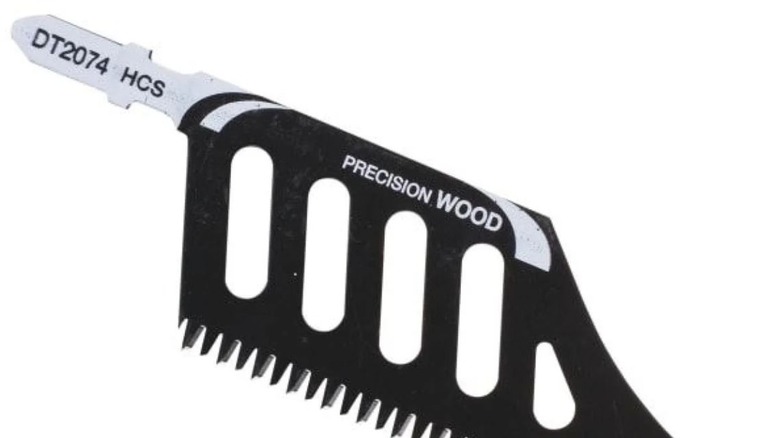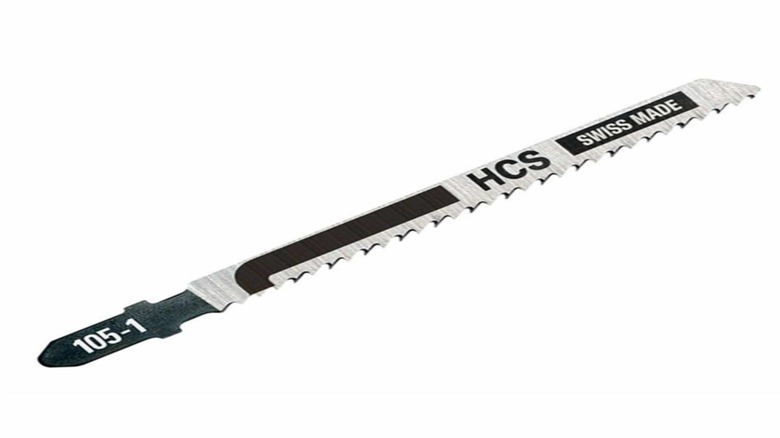What Does HCS Stand For On A DeWalt Blade?
With over 100 years of experience in manufacturing tools for various applications, Dewalt has established a reputation for durable and quality products. Featured on the DeWalt website is a wide selection of products ranging from power tools, hand tools, storage options, and some automotive and outdoor-related products. DeWalt also offers accessories and consumables for their tools, including drill bits, cutting wheels, grinding discs, and blades. For its blade line, certain products have the HCS marking, which means it is made from high-carbon steel.
High-carbon steel is a type of steel alloy, and Dewalt and other tool manufacturers normally use alloyed steel in their tools. This is because tools are often subjected to rough use and receive a lot of wear and tear from frequent usage; a stronger type of steel is essential. Alloying steel is the process of combining several metallic elements that greatly improve the steel's strength, durability, and resistance to heat, corrosion, and wear. Tools made from carbon alloy steel have a composition that normally contains only 98.1 – 99.1% iron and 0.30–0.90% manganese, in addition to the 0.60 – 1.00% carbon.
There are several grades of carbon alloyed steel; the one used by Dewalt for its tools is high-carbon steel, or carbon tool steel, or M2. This is steel that contains more than 0.6% carbon. Steel containing less than 0.6% carbon is classified as medium or low-carbon, while steel that has a carbon content exceeding 1.0% is classified as ultra-high-carbon steel. The most common applications for HCS are those that require strength and resistance, such as toys and appliances, automobiles, manufacturing, construction, and retail. Low-carbon steel, on the other hand, is frequently used for things that don't require a lot of push-on, pull-off effort, like nails, pipes, and wires.
Pros and cons of high-carbon steel
The benefit of the extra carbon in HCS is that it improves the steel's resistance to wear, tensile strength, and hardness. However, there are also several drawbacks, since the increased carbon content also makes these steels less ductile and more brittle when subjected to impact or stress. Additionally, high-carbon steel is also more difficult to weld, as martensite can form due to rapid cooling during the welding process, which can lead to cracks. Other disadvantages of high-carbon steel are its lower resistance to corrosion due to its low chromium content, and it has poor edge retention, which means it requires more sharpening to retain its edge or sharpness.
DeWalt has many blade products that are made from HCS. These include jigsaw, hacksaw, and oscillating blades for woodworking. These blades are designed to provide quality cuts on a range of softer materials, such as plastics, laminates, and wood. For tougher materials like metal, Dewalt also has a selection of blades made of high-speed steel, bimetal, and carbide. These are specifically made for heavy-duty work, as carbide-tipped blades can cut through a variety of steels, including mild steel, aluminum, and other non-ferrous metals.
High-carbon blades are popular because of their durability even after frequent use. In addition, high-carbon steel blades are well-suited for a variety of tasks, from cutting, slicing, and chopping, which makes them a great option for those looking for blades that are tough, easy to sharpen, and low-cost. Compared to alternatives like stainless steel or super steel, high-carbon blades are less expensive. But because they are more prone to rust and corrosion, it is worth bearing in mind that HCS blades will need more maintenance to keep its optimum performance.

